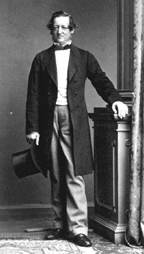Charles William Harrison Pickering Obiturary
Click here for the parents of CWHP
 Charles William Harrison Pickering [1815-1881] |
|
|
|
|
The following text and the photo (above) was taken from a newly-discovered book, Schroders, Merchants & Bankers, by Richard Roberts, (Macmillian Press, Ltd., J. Henry Schroder Wagg & Co., Ltd 1992).
Merchant Banker, Liverpool
Christian Matthias Schroder & Co. was the leading Schroder firm in Hamburg from the 1760s to the 1850s. During the 1820s, 1830s and 1840s Schroder ships, named after female members of the family, plied their way to South America and to the Baltic, and the firm conducted a large business as an importer of coffee, spices, grain, wine and textiles. In the United States, a younger son of Christian Mattias II and a second cousin formed Schorder, Mummy & Co. in New Orleans in 1848, with an eye to participating in the cotton trade, and in 1856 a a mercantile house which conducted a general commission business was formed.
This gave rise to the specialist activity which in time came to be called 'merchant banking'.
J. Henry Schroder & Co., was an active participant in the development of the sterling bill of exchange as the foremost instrument for the finance of international trade. 'Merchants & Bankers' was the term by which J. Henry Schroder & Co., styled itself until well into the twentieth century.
By mid-century, Hamburg was the largest port not only of Germany but also of continental Europe, and the fourth largest port in the world after London, Liverpool and New York.
In July 1839, Johann Heinrich established a third firm, J. H. Schroder & Co., in Liverpool. To manage the firm he engaged Nikolaus Mahs, and Charles Pickering, a local man from the family of Pickering Brothers, Liverpool corn merchants. Pickering and Mahs were taken into partnership in October 1842, apparently to satisfy the Liverpool branch of the Bank of England, which was unwilling to allow the firm to open a drawing account in the absence of a resident partner.
The 1850s were highly successful years for Johann Heinrich's Liverpool house. By the end of the decade it was the fourth largest recipient of consignments of cotton in Liverpool. In these years the firm was run by Charles Pickering and the chief clerk, Julius Servaes, who was made an associate partner in 1856. Nikolas Mahs, who had been taken into partnership along with Pickering in 1842, resigned to form his own firm.
Schroder's consignment business stagnated in the early 1870s and went into long-term decline from 1876. The contraction of the firm's activity was accelerated by changes particular to the tallow, grain and sugar trades - the most important goods it received on consignment. The tallow trade waned in the 1860s with the advent of kerosene oil lamps, which also meant a shift in the pattern of trade away from Russia, since it was the Pennsylvania oil field that supplied the world's petroleum requirements in the early days of the industry. Likewise, the grain trade was shifting from the Baltic and the Black Sea to the Atlantic, because American grain was superior in quality and cheaper. Lastly, developments in the Cuban sugar industry [dried up] that source of consignments.
While the business of the Produce Deparment declined, that of J. H. Schroder & Co.. of Liverpool and the other cotton consignement merchants virtually disappeared following the opening of the Atlantic Telegraph in 1866, which permitted direct contact between buyers and sellers, thus eliminating their role. Charles Pickering, who had been there from the outset, was a spent force and retired in 1881 [ed. He also died in 1881].
From 1869 onwards the accounts of J. Henry Schroder & Co., show large balances on account of the Liverpool house, suggesting that its capital was not being actively employed in business, and in 1883, upon the death of Johann Heinrich, the firm was wound up.
[ed. The Schroder business and banking dynasty continued through both World Wars and through many mergers, and generations of Schroders, still exists today . . . ]
Many [banks] were acquired by British or overseas banks, but most of the highly regarded firms remained independent. Schroders, which enjoyed a head start on account of its US interests, pushed the internationalisation of its business further than most of the other London merchant banks. The establishment of the international Schroder group of companies in the 1960s, 1970 and early 1980s was the first stage in this process. The second stage, which was achieved in the latter half of the 1980s, was the integration of the conduct of operations on a worldwide basis. In these years, the international Schroder group of companies became a single entity - Schroders.